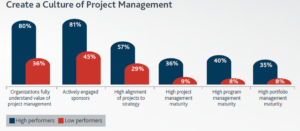As far as I can tell, at the most basic level, all organizations exist to do two things: activities intended to sustain daily operations, and activities designed to improve and grow the business. I don’t know any organization in which the purpose or goal is to drive the business into the ground. For clarity, the first of these things, operations, relates to the routine daily activities that keep the business running. I’m concerned here, however, with the latter—the work that enhances the business and enables it to grow.
I’m talking of course about using project management. But project management is merely a means to an end; it is not the solution to all that ails a struggling organization. We’ve all heard variations on the saying “culture trumps process every day.” In my view, the one thing that may actually be more important than having solid project management process is the need to have an organizational culture that embraces project success. What do I mean by this? Let’s start by taking a look at “organizational culture.”
What is organizational culture?
Business leaders, human resources personnel, managers—everyone talks about culture, but is it ever properly defined and explained? We’re told, “Oh, come work here, we have a fantastic culture.” What does that even mean? Can I take two-hour lunches and leave at 3 pm on Fridays? That’s not culture; that’s convenience. And frankly, it suggests laziness. No, culture goes beyond all the things we think about when we imagine our dream job. Sure, some of those perks are nice-to-haves, but seasoned executives—the men and women who run Fortune 500 companies—will likely tell you that none of that has anything to do with culture.
Culture, to me, is a common understanding of and commitment to a shared vision and set of values across the enterprise that inure to the benefit of the organization. It’s not just “this is how we do things here;” it’s a feeling, a general orientation, an awareness and, frankly, a responsibility. Does everyone in the organization understand why the company exists and what it does? Do individuals understand how their work contributes to the company? Does the organization celebrate diversity and respect? Are employees encouraged to voice opinions and how many bureaucratic layers exist if you’re looking to get something done? The answers to these and other questions will give you an indication of the organizational culture within a company.
I like to think about it as chemistry. To draw a sports analogy, think about the great teams that have won professional championships. The one thing all of them having in common besides players at the top of their game is this unquantifiable feeling of chemistry, of unity, of common purpose and camaraderie. To me, that’s what culture is all about, and it’s not something you can necessarily identify and write in a promotional brochure or orientation policy manual.
Make Project Success a Stated Goal
Now, I’ve worked in good cultures and corrosive cultures, and I’ve had opportunity to observe and learn about the culture of dozens of organizations I’ve collaborated with during my career. My impression is that successful companies today are those that include project success as part of their culture. Not project management –that’s a tool, a methodology, a framework for getting things done. I’m talking about an environment in which project success is a stated goal. As managers and leaders, we say we are results-driven or outcome-oriented; but more important, I think, is that the organization as a whole understand the need to achieve project success.
Making project success a part of an organization’s culture means that those who are responsible for setting the vision –the leadership—are taking into consideration that one way to grow is to support project by project wins that propel the organization forward. This means that every project leader, functional manager and executive in the organization knows and understands that when each business unit succeeds on a project the entire organization succeeds as a whole. Some may view this as results-oriented culture, but I like to call it project success culture.
Don’t Just Take My Word for It
A 2015 study by the Project Management Institute (www.pmi.org) found that the most effective organizations embrace a project management success culture by, among other things, understanding the value of project management, by aligning project initiatives to the organization’s strategic goals, and by requiring active engagement of executives on projects. The study demonstrates that high-performing organizations with the characteristics outlined in the graphic below have significantly higher project success.

So, lest there be any doubt, commitment to project success leads to organizational success. It goes beyond just internal policies, risk tolerance, and resource management. Cultural success, according to the Guide to the Project Management Body of Knowledge (PMBOK Guide), speaks to executing on the shared vision and values, beliefs and expectations—the components of organizational culture that shape what employees do and how they do it; what motivates them and how they are rewarded. In addition, organizational culture eventually comes to be defined by employees’ views of leadership and authority, the code of conduct throughout an organization, and the overall operating environment.
Often culture is thought to consist of policies and practices in which organizations define what they ought to do. But what really defines culture is how the policies and practices are applied. This may be written down or not; most of it is usually just “understood.” In the end, organizations are going to find that embracing a culture of project success –one that fully understands the value of project management—is not only going to support strategic initiatives but will also create value and give organizations a competitive advantage.
Conclusion
Once upon a time, I worked for a leader who at the end of each year would send a note to all the people within the IT sphere of responsibility to summarize the projects completed that year and how they impacted the business. It was a keen reminder of the project wins (and occasional losses) we had achieved as a business unit within the larger organization. Now, this was but a microcosm of a larger firm, but still, it made people feel good –like they contributed in a meaningful way—and frankly, we all came to expect and enjoy the report card each year. More importantly, it telegraphs to everyone the value of and the organizational emphasis that was placed on project success. It let everyone know, and sure enough, each year following that email after the last glass of New Year champagne was gone, we all began clamoring to get our projects moving forward again. Culture may trump process, but a culture of project success trumps everything else, in my view.
If you need help creating a culture of project success, reach out to eDPM Advisory Services (www.edpmadvisory.com) and ask about our project management and process improvement services and training.
